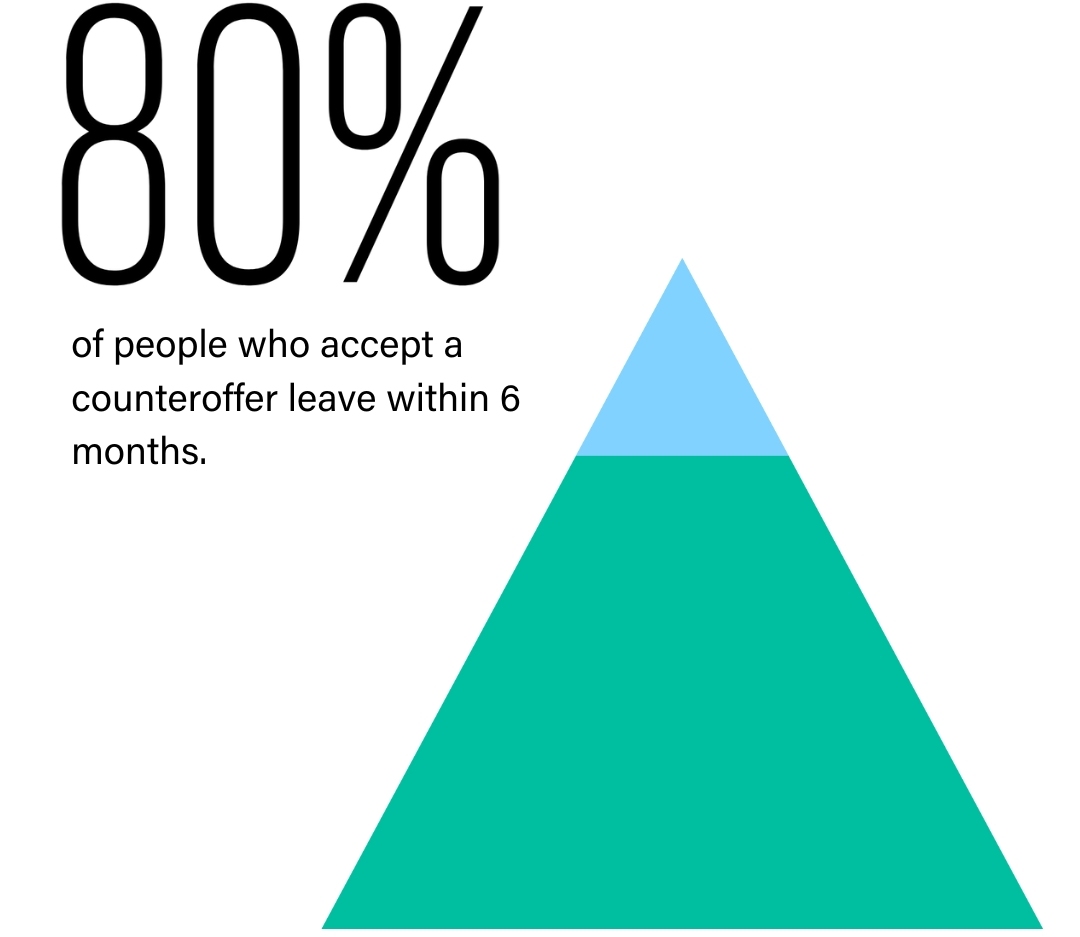Counteroffers are a standard part of the job search process. They occur when you’ve accepted a new opportunity, and your current employer offers you incentives to stay. While it may seem easier to take the counteroffer and remain in a familiar environment, it’s important to recognise that a counteroffer may merely serve as a temporary solution to the underlying reasons that led you to consider leaving in the first place.
Understanding how to navigate the negotiation process during your job search can equip you with valuable skills and the confidence to excel in your next opportunity. This article will guide you through counteroffers, making sure you can manage them if and when they happen.
Did you know…
Only 23% of employees who accept counter offers receive the promised raise or promotion within a year.
What are counteroffers
We work with professionals at the highest level—individuals with the skills and experience that make them magnets for businesses. With that level of expertise comes options. When the dream opportunity arrives, and a resignation letter is submitted, it’s common for the current employer to counter with an offer designed to retain top talent.
Here are some examples of what a counteroffer might include:
- Salary increase
- Increased benefits package
- Job title change
- More responsibilities
- New working arrangements

The pros and cons of counteroffers
Cons
- It’s a short-term fix on other underlying issues
- Your employer might question your loyalty
- You could miss out on new projects, opportunities and career advancements
Questions to ask yourself
Before accepting a counteroffer, make sure you ask yourself…
- Will the counteroffer solve the underlying issues?
- Will accepting the counteroffer affect my long-term career goals?
- Would I have considered staying if it was offered before I received the new job offer?
Why it’s important to know how to manage counteroffers
There’s no universal right or wrong decision when it comes to counteroffers. For some, it may be the recognition they needed; for others, it might be too little, too late. It’s crucial to ask yourself, “Why did I want to leave in the first place?” A counteroffer might seem appealing, but if the motivations for wanting to move on still exist, those issues are likely to resurface later.
Employers often make counteroffers because retaining existing staff is cheaper and less disruptive than hiring new employees or addressing deeper problems within the company. However, this doesn’t necessarily mean they fully recognise your value.
Use the experience as an opportunity for professional development. By handling a counteroffer professionally, you can enhance your decision-making, negotiation, and communication skills.

How to respond to a counteroffer
Give yourself time to consider the decision carefully. You’re not expected to respond immediately, and you should resist any pressure to make a quick decision.
The best approach is to respond via email, allowing you to articulate your decision clearly. Follow up with a phone call to express your gratitude personally. Here’s a template you might use:
“Hi, their name,
Thank you for your offer. After carefully considering it, I have decided to [accept/decline] it.
[Include a brief explanation of your decision, if appropriate.]
Thank you again for the opportunity and your understanding.
Your name“

Manage counteroffers with confidence
No matter how often you face a counteroffer, deciding whether to accept it can be challenging. We truly believe that by the time you’re considering a counteroffer, you’ve already made your decision to move on.
When you work with a recruitment consultant, you have an expert on your side who can help you navigate the complexities of counteroffers. We’re here to support you in making decisions that align with your long-term career goals, making sure that you move forward with confidence.
